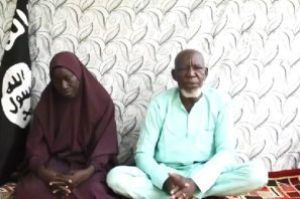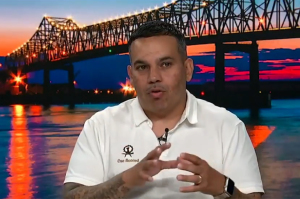Pastor barred from execution chamber over anti-death penalty activism, arrests

An Oklahoma inmate on death row is not allowed to have his minister inside the execution chamber on Thursday when he is scheduled to receive lethal injection after the state denied the minister access over his history of anti-death penalty activism.
The Oklahoma Department of Corrections denied 61-year-old Scott Eizember permission to have The Rev. Jeff Hood of Arkansas inside his execution chamber during his lethal injection as Hood's history of anti-death penalty activism includes an arrest.
"Out of respect for the families of victims, ODOC will not allow the outbursts of activists to interfere, regardless of that activist's declared role in this process," Josh Ward, a DOC spokesperson, wrote in a statement shared with media.
"The spiritual advisor, in this case, has been arrested multiple times for such outbursts in other states, demonstrating a blatant disregard for the experiences of victims' families and the solemnity of the process."
Eizember is sentenced to die at the Oklahoma State Penitentiary in McAlester after his conviction for the murders of an elderly couple in eastern Oklahoma in mid-October of 2003.
Ward said Hood, an Old Catholic priest, is still allowed to meet with Eizember during the time leading up to his execution, according to The Associated Press.
Additionally, Ward said Hood could view the execution through a closed-circuit feed in a different part of the facility.
Hood and Eizember filed a lawsuit in federal district court on Monday, hoping that Eizember's execution will be held or postponed until Hood is permitted to enter the chamber. Eizember claims the DOC's decision violates his First Amendment right to religious exercise.
Hood was arrested for peacefully protesting outside a Texas prison in 2016. He said he received a deferred sentence, and the case was expunged from his record.
"We really think this is certainly not just a violation of religious liberty, but also a violation of other First Amendment protections," Hood said.
Eizember's lawyer, Randall Coyne, told The Washington Post that Hood has been arrested three times in connection with social justice activism but assured that Hood would not interfere with Eizember's execution if he is allowed to attend.
"He's never disrupted an execution," Coyne said. "There's a difference between his advocacy as a human rights activist and his work as a spiritual adviser."
States are to allow clergy to be present inside the death chamber during executions after a 2021 U.S. Supreme Court ruling in favor of a death row inmate in Alabama who was denied the presence of his pastor in the execution chamber.
Faith groups such as The Southern Baptist Convention's Ethics & Religious Liberty Commission, the National Association of Evangelicals and many others issued briefs in defense of death row inmates' right to have clergy present during their executions.
Eizember's execution sentencing was upheld in 2007 by a 3-2 vote of the Oklahoma Court of Criminal Appeals. AP reports that Eizember committed multiple crimes in his lifetime, including a multi-state crime spree where he became the focus of a 37-day manhunt.
Eizember was also convicted of shooting with intent to kill the then-16-year-old son of his ex-girlfriend and assault with a dangerous weapon against the mother of his ex-girlfriend.
On Nov. 23, 2003, Eizember was discovered hiding in a Depew church after a 75-year-old volunteer found him there. Eizember escaped from the church by stealing the church volunteer's vehicle.
Eizember was later captured outside Lufkin, Texas, after he kidnapped an Arkansas physician and his wife and held them hostage at gunpoint for six hours as he forced them to drive him to Texas.
The physician shot Eizember four times with a gun his wife kept in their vehicle.
The Oklahoma Pardon and Parole Board voted 3-2 in December not to grant clemency for Eizember.
The Oklahoma appellate court produced an 84-page majority opinion upholding Eizember's sentencing written by Judge Gary Lumpkin of Madill, which rejected Eizember's claims that his death sentence should be reversed.
"It is clear from their responses, both written and oral, that each of these jurors could be a fair and impartial juror, consider all three penalty options and follow the law and instructions given by the court," reads the 2007 opinion.
In a six-page dissenting opinion, Judge Charles Chapel of Tulsa reportedly wrote that the death penalty "should be set aside" because Eizember's trial "was tainted when biased jurors who sat on his jury should have been excused."
"Biased jurors were allowed to serve on Eizember's trial, even though he requested they be removed for cause, and despite clear pretrial statements indicating their biases," the decision reads. "A capital juror must be able to fairly consider all three punishment options."
Judge Arlene Johnson of Oklahoma City joined Chapel in dissent of the execution.
Nicole Alcindor is a reporter for The Christian Post. She can be reached at: nicole.alcindor@christianpost.com.




























